Nursing Leadership and Healthcare Management
VerifiedAdded on 2020/03/02
|13
|3805
|178
AI Summary
This assignment delves into the crucial role of nursing leadership within healthcare management. It examines various leadership theories and models relevant to nursing, such as transformational and interprofessional leadership. The assignment analyzes the influence of effective nursing leadership on factors like patient safety, quality of care delivery, staff retention, and overall organizational performance. Additionally, it explores the challenges and opportunities faced by nursing leaders in contemporary healthcare settings.
Contribute Materials
Your contribution can guide someone’s learning journey. Share your
documents today.
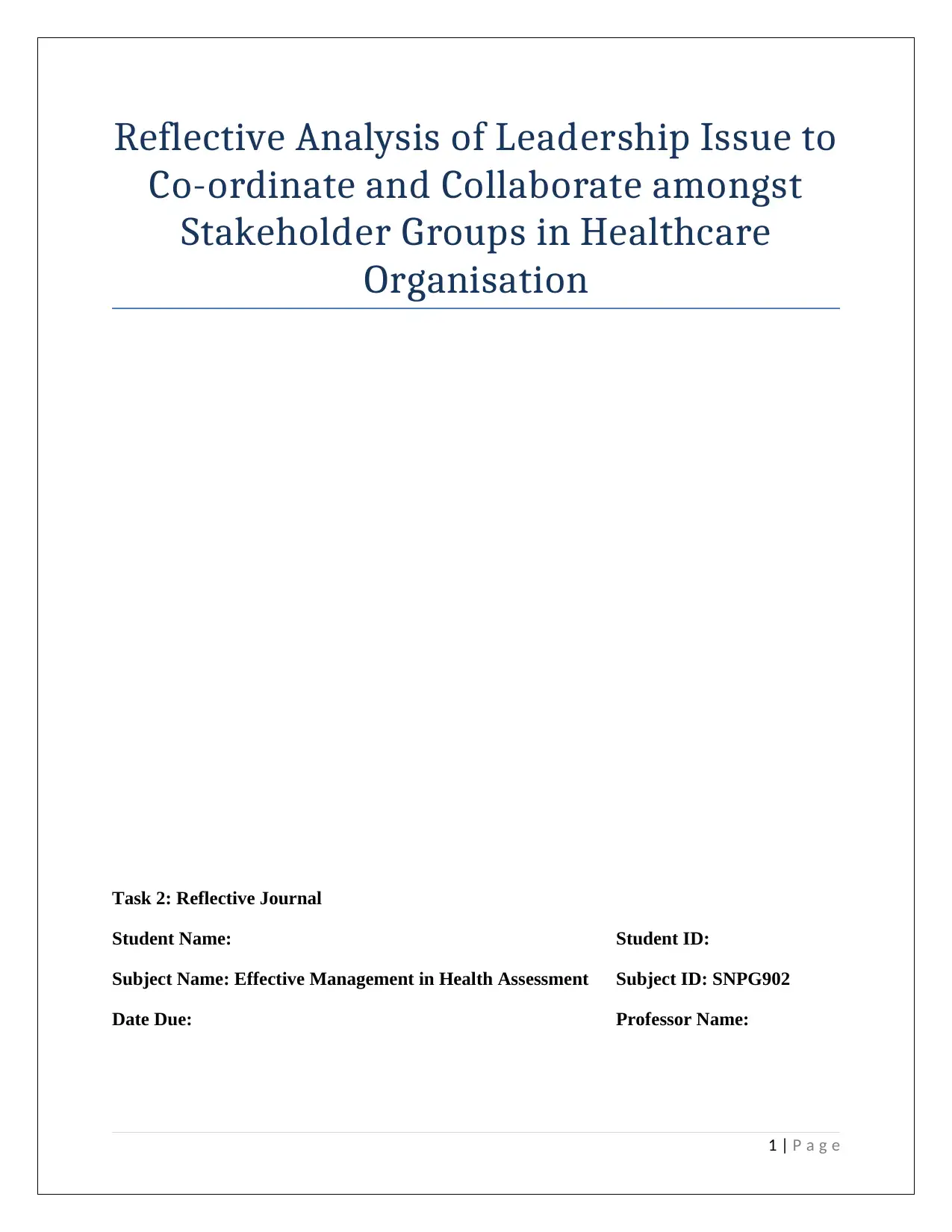
Reflective Analysis of Leadership Issue to
Co-ordinate and Collaborate amongst
Stakeholder Groups in Healthcare
Organisation
Task 2: Reflective Journal
Student Name: Student ID:
Subject Name: Effective Management in Health Assessment Subject ID: SNPG902
Date Due: Professor Name:
1 | P a g e
Co-ordinate and Collaborate amongst
Stakeholder Groups in Healthcare
Organisation
Task 2: Reflective Journal
Student Name: Student ID:
Subject Name: Effective Management in Health Assessment Subject ID: SNPG902
Date Due: Professor Name:
1 | P a g e
Secure Best Marks with AI Grader
Need help grading? Try our AI Grader for instant feedback on your assignments.
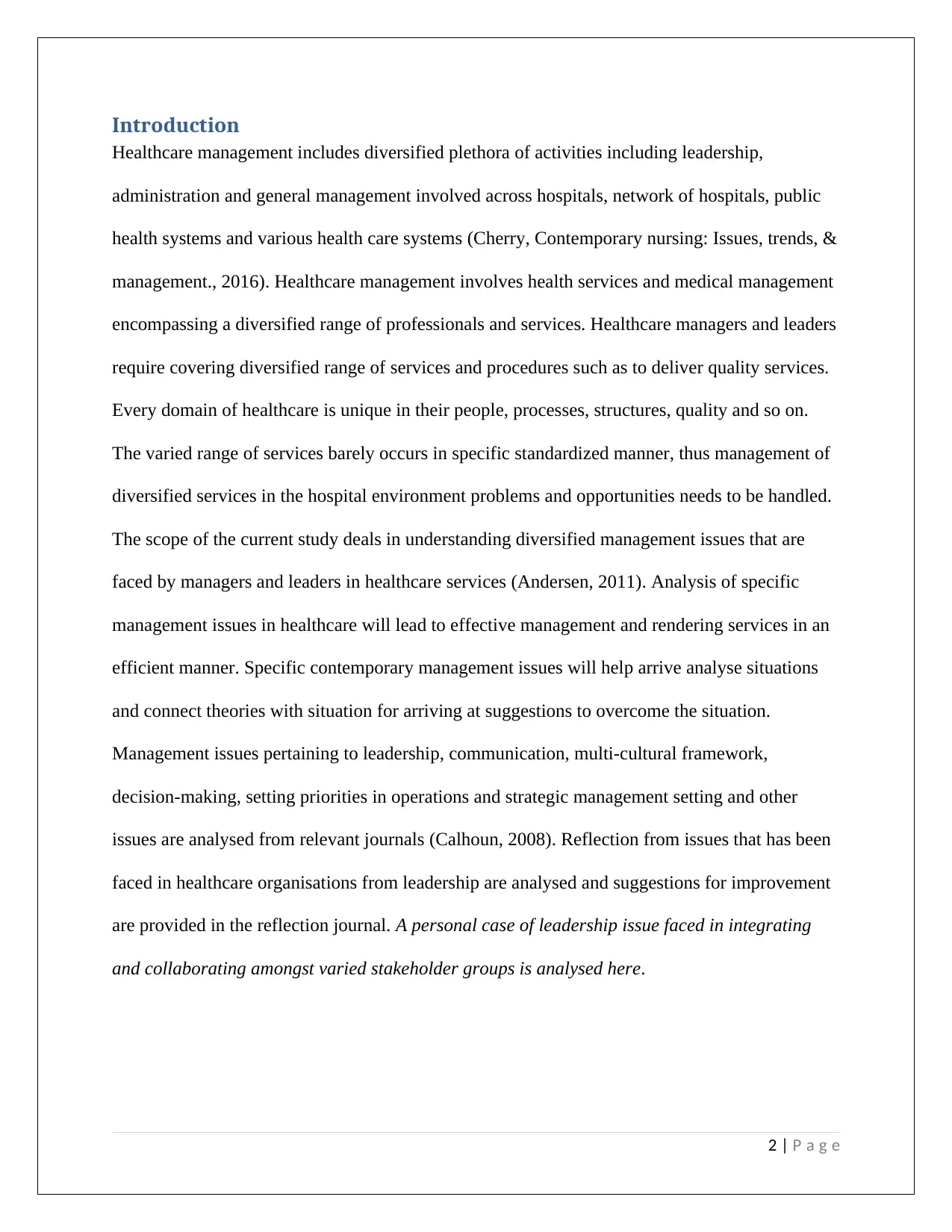
Introduction
Healthcare management includes diversified plethora of activities including leadership,
administration and general management involved across hospitals, network of hospitals, public
health systems and various health care systems (Cherry, Contemporary nursing: Issues, trends, &
management., 2016). Healthcare management involves health services and medical management
encompassing a diversified range of professionals and services. Healthcare managers and leaders
require covering diversified range of services and procedures such as to deliver quality services.
Every domain of healthcare is unique in their people, processes, structures, quality and so on.
The varied range of services barely occurs in specific standardized manner, thus management of
diversified services in the hospital environment problems and opportunities needs to be handled.
The scope of the current study deals in understanding diversified management issues that are
faced by managers and leaders in healthcare services (Andersen, 2011). Analysis of specific
management issues in healthcare will lead to effective management and rendering services in an
efficient manner. Specific contemporary management issues will help arrive analyse situations
and connect theories with situation for arriving at suggestions to overcome the situation.
Management issues pertaining to leadership, communication, multi-cultural framework,
decision-making, setting priorities in operations and strategic management setting and other
issues are analysed from relevant journals (Calhoun, 2008). Reflection from issues that has been
faced in healthcare organisations from leadership are analysed and suggestions for improvement
are provided in the reflection journal. A personal case of leadership issue faced in integrating
and collaborating amongst varied stakeholder groups is analysed here.
2 | P a g e
Healthcare management includes diversified plethora of activities including leadership,
administration and general management involved across hospitals, network of hospitals, public
health systems and various health care systems (Cherry, Contemporary nursing: Issues, trends, &
management., 2016). Healthcare management involves health services and medical management
encompassing a diversified range of professionals and services. Healthcare managers and leaders
require covering diversified range of services and procedures such as to deliver quality services.
Every domain of healthcare is unique in their people, processes, structures, quality and so on.
The varied range of services barely occurs in specific standardized manner, thus management of
diversified services in the hospital environment problems and opportunities needs to be handled.
The scope of the current study deals in understanding diversified management issues that are
faced by managers and leaders in healthcare services (Andersen, 2011). Analysis of specific
management issues in healthcare will lead to effective management and rendering services in an
efficient manner. Specific contemporary management issues will help arrive analyse situations
and connect theories with situation for arriving at suggestions to overcome the situation.
Management issues pertaining to leadership, communication, multi-cultural framework,
decision-making, setting priorities in operations and strategic management setting and other
issues are analysed from relevant journals (Calhoun, 2008). Reflection from issues that has been
faced in healthcare organisations from leadership are analysed and suggestions for improvement
are provided in the reflection journal. A personal case of leadership issue faced in integrating
and collaborating amongst varied stakeholder groups is analysed here.
2 | P a g e
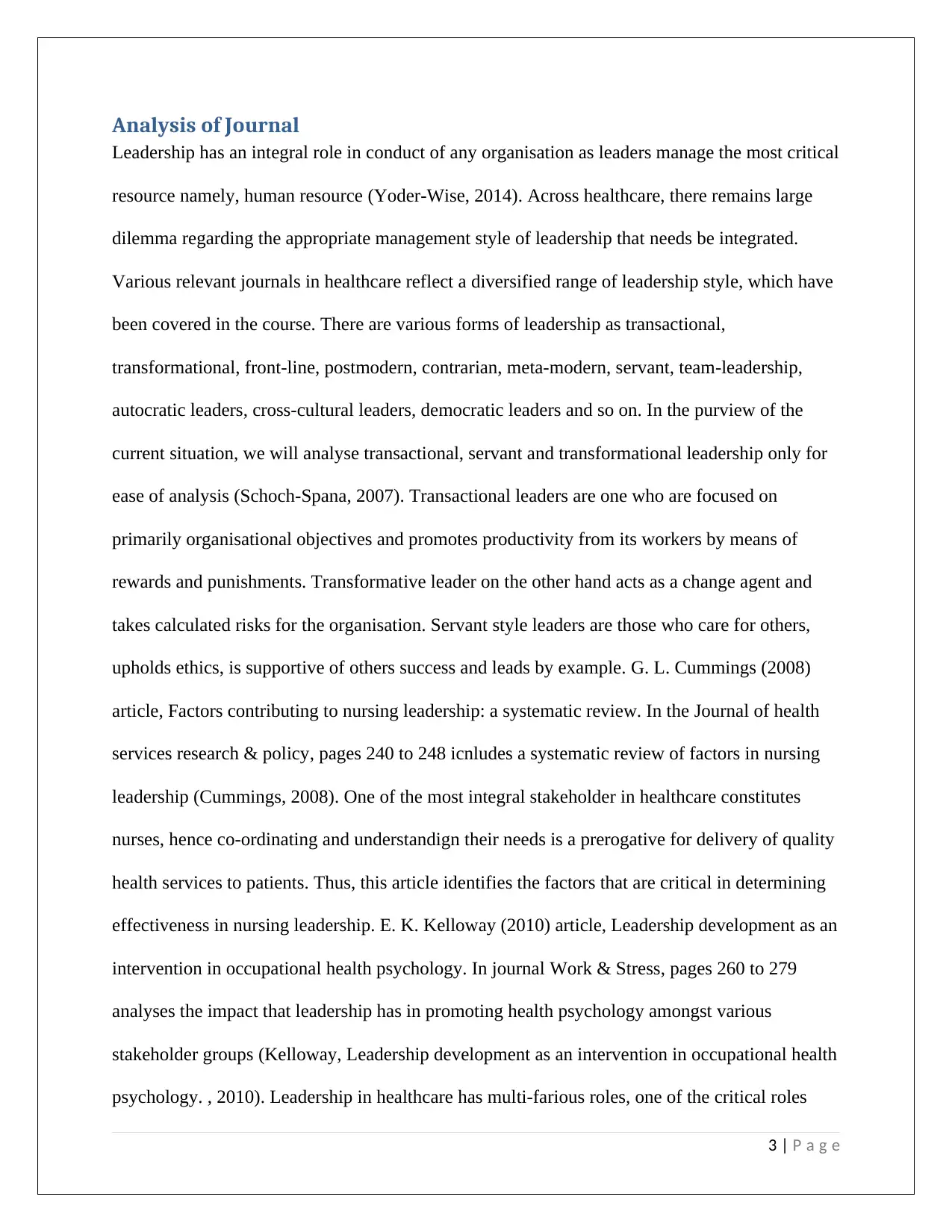
Analysis of Journal
Leadership has an integral role in conduct of any organisation as leaders manage the most critical
resource namely, human resource (Yoder-Wise, 2014). Across healthcare, there remains large
dilemma regarding the appropriate management style of leadership that needs be integrated.
Various relevant journals in healthcare reflect a diversified range of leadership style, which have
been covered in the course. There are various forms of leadership as transactional,
transformational, front-line, postmodern, contrarian, meta-modern, servant, team-leadership,
autocratic leaders, cross-cultural leaders, democratic leaders and so on. In the purview of the
current situation, we will analyse transactional, servant and transformational leadership only for
ease of analysis (Schoch-Spana, 2007). Transactional leaders are one who are focused on
primarily organisational objectives and promotes productivity from its workers by means of
rewards and punishments. Transformative leader on the other hand acts as a change agent and
takes calculated risks for the organisation. Servant style leaders are those who care for others,
upholds ethics, is supportive of others success and leads by example. G. L. Cummings (2008)
article, Factors contributing to nursing leadership: a systematic review. In the Journal of health
services research & policy, pages 240 to 248 icnludes a systematic review of factors in nursing
leadership (Cummings, 2008). One of the most integral stakeholder in healthcare constitutes
nurses, hence co-ordinating and understandign their needs is a prerogative for delivery of quality
health services to patients. Thus, this article identifies the factors that are critical in determining
effectiveness in nursing leadership. E. K. Kelloway (2010) article, Leadership development as an
intervention in occupational health psychology. In journal Work & Stress, pages 260 to 279
analyses the impact that leadership has in promoting health psychology amongst various
stakeholder groups (Kelloway, Leadership development as an intervention in occupational health
psychology. , 2010). Leadership in healthcare has multi-farious roles, one of the critical roles
3 | P a g e
Leadership has an integral role in conduct of any organisation as leaders manage the most critical
resource namely, human resource (Yoder-Wise, 2014). Across healthcare, there remains large
dilemma regarding the appropriate management style of leadership that needs be integrated.
Various relevant journals in healthcare reflect a diversified range of leadership style, which have
been covered in the course. There are various forms of leadership as transactional,
transformational, front-line, postmodern, contrarian, meta-modern, servant, team-leadership,
autocratic leaders, cross-cultural leaders, democratic leaders and so on. In the purview of the
current situation, we will analyse transactional, servant and transformational leadership only for
ease of analysis (Schoch-Spana, 2007). Transactional leaders are one who are focused on
primarily organisational objectives and promotes productivity from its workers by means of
rewards and punishments. Transformative leader on the other hand acts as a change agent and
takes calculated risks for the organisation. Servant style leaders are those who care for others,
upholds ethics, is supportive of others success and leads by example. G. L. Cummings (2008)
article, Factors contributing to nursing leadership: a systematic review. In the Journal of health
services research & policy, pages 240 to 248 icnludes a systematic review of factors in nursing
leadership (Cummings, 2008). One of the most integral stakeholder in healthcare constitutes
nurses, hence co-ordinating and understandign their needs is a prerogative for delivery of quality
health services to patients. Thus, this article identifies the factors that are critical in determining
effectiveness in nursing leadership. E. K. Kelloway (2010) article, Leadership development as an
intervention in occupational health psychology. In journal Work & Stress, pages 260 to 279
analyses the impact that leadership has in promoting health psychology amongst various
stakeholder groups (Kelloway, Leadership development as an intervention in occupational health
psychology. , 2010). Leadership in healthcare has multi-farious roles, one of the critical roles
3 | P a g e
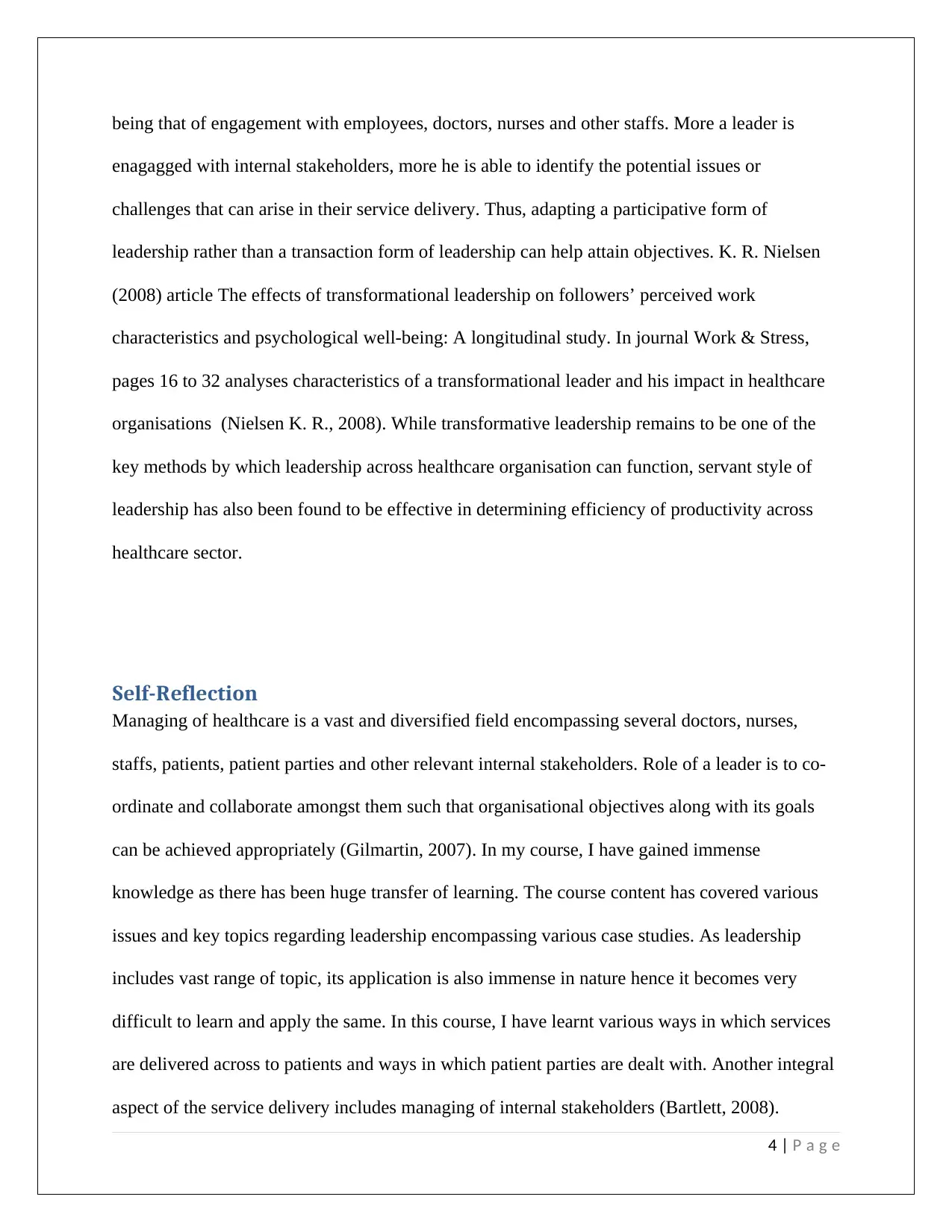
being that of engagement with employees, doctors, nurses and other staffs. More a leader is
enagagged with internal stakeholders, more he is able to identify the potential issues or
challenges that can arise in their service delivery. Thus, adapting a participative form of
leadership rather than a transaction form of leadership can help attain objectives. K. R. Nielsen
(2008) article The effects of transformational leadership on followers’ perceived work
characteristics and psychological well-being: A longitudinal study. In journal Work & Stress,
pages 16 to 32 analyses characteristics of a transformational leader and his impact in healthcare
organisations (Nielsen K. R., 2008). While transformative leadership remains to be one of the
key methods by which leadership across healthcare organisation can function, servant style of
leadership has also been found to be effective in determining efficiency of productivity across
healthcare sector.
Self-Reflection
Managing of healthcare is a vast and diversified field encompassing several doctors, nurses,
staffs, patients, patient parties and other relevant internal stakeholders. Role of a leader is to co-
ordinate and collaborate amongst them such that organisational objectives along with its goals
can be achieved appropriately (Gilmartin, 2007). In my course, I have gained immense
knowledge as there has been huge transfer of learning. The course content has covered various
issues and key topics regarding leadership encompassing various case studies. As leadership
includes vast range of topic, its application is also immense in nature hence it becomes very
difficult to learn and apply the same. In this course, I have learnt various ways in which services
are delivered across to patients and ways in which patient parties are dealt with. Another integral
aspect of the service delivery includes managing of internal stakeholders (Bartlett, 2008).
4 | P a g e
enagagged with internal stakeholders, more he is able to identify the potential issues or
challenges that can arise in their service delivery. Thus, adapting a participative form of
leadership rather than a transaction form of leadership can help attain objectives. K. R. Nielsen
(2008) article The effects of transformational leadership on followers’ perceived work
characteristics and psychological well-being: A longitudinal study. In journal Work & Stress,
pages 16 to 32 analyses characteristics of a transformational leader and his impact in healthcare
organisations (Nielsen K. R., 2008). While transformative leadership remains to be one of the
key methods by which leadership across healthcare organisation can function, servant style of
leadership has also been found to be effective in determining efficiency of productivity across
healthcare sector.
Self-Reflection
Managing of healthcare is a vast and diversified field encompassing several doctors, nurses,
staffs, patients, patient parties and other relevant internal stakeholders. Role of a leader is to co-
ordinate and collaborate amongst them such that organisational objectives along with its goals
can be achieved appropriately (Gilmartin, 2007). In my course, I have gained immense
knowledge as there has been huge transfer of learning. The course content has covered various
issues and key topics regarding leadership encompassing various case studies. As leadership
includes vast range of topic, its application is also immense in nature hence it becomes very
difficult to learn and apply the same. In this course, I have learnt various ways in which services
are delivered across to patients and ways in which patient parties are dealt with. Another integral
aspect of the service delivery includes managing of internal stakeholders (Bartlett, 2008).
4 | P a g e
Secure Best Marks with AI Grader
Need help grading? Try our AI Grader for instant feedback on your assignments.
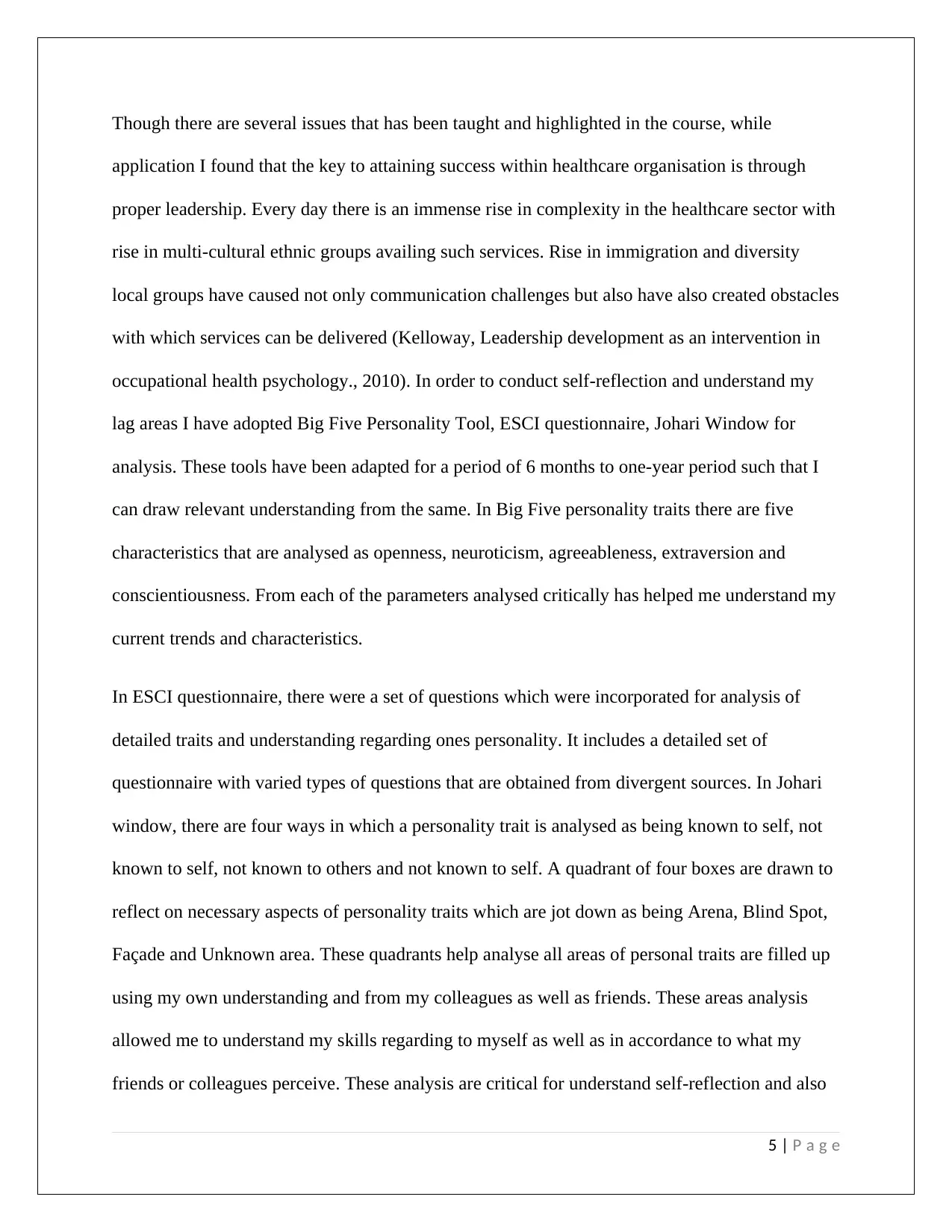
Though there are several issues that has been taught and highlighted in the course, while
application I found that the key to attaining success within healthcare organisation is through
proper leadership. Every day there is an immense rise in complexity in the healthcare sector with
rise in multi-cultural ethnic groups availing such services. Rise in immigration and diversity
local groups have caused not only communication challenges but also have also created obstacles
with which services can be delivered (Kelloway, Leadership development as an intervention in
occupational health psychology., 2010). In order to conduct self-reflection and understand my
lag areas I have adopted Big Five Personality Tool, ESCI questionnaire, Johari Window for
analysis. These tools have been adapted for a period of 6 months to one-year period such that I
can draw relevant understanding from the same. In Big Five personality traits there are five
characteristics that are analysed as openness, neuroticism, agreeableness, extraversion and
conscientiousness. From each of the parameters analysed critically has helped me understand my
current trends and characteristics.
In ESCI questionnaire, there were a set of questions which were incorporated for analysis of
detailed traits and understanding regarding ones personality. It includes a detailed set of
questionnaire with varied types of questions that are obtained from divergent sources. In Johari
window, there are four ways in which a personality trait is analysed as being known to self, not
known to self, not known to others and not known to self. A quadrant of four boxes are drawn to
reflect on necessary aspects of personality traits which are jot down as being Arena, Blind Spot,
Façade and Unknown area. These quadrants help analyse all areas of personal traits are filled up
using my own understanding and from my colleagues as well as friends. These areas analysis
allowed me to understand my skills regarding to myself as well as in accordance to what my
friends or colleagues perceive. These analysis are critical for understand self-reflection and also
5 | P a g e
application I found that the key to attaining success within healthcare organisation is through
proper leadership. Every day there is an immense rise in complexity in the healthcare sector with
rise in multi-cultural ethnic groups availing such services. Rise in immigration and diversity
local groups have caused not only communication challenges but also have also created obstacles
with which services can be delivered (Kelloway, Leadership development as an intervention in
occupational health psychology., 2010). In order to conduct self-reflection and understand my
lag areas I have adopted Big Five Personality Tool, ESCI questionnaire, Johari Window for
analysis. These tools have been adapted for a period of 6 months to one-year period such that I
can draw relevant understanding from the same. In Big Five personality traits there are five
characteristics that are analysed as openness, neuroticism, agreeableness, extraversion and
conscientiousness. From each of the parameters analysed critically has helped me understand my
current trends and characteristics.
In ESCI questionnaire, there were a set of questions which were incorporated for analysis of
detailed traits and understanding regarding ones personality. It includes a detailed set of
questionnaire with varied types of questions that are obtained from divergent sources. In Johari
window, there are four ways in which a personality trait is analysed as being known to self, not
known to self, not known to others and not known to self. A quadrant of four boxes are drawn to
reflect on necessary aspects of personality traits which are jot down as being Arena, Blind Spot,
Façade and Unknown area. These quadrants help analyse all areas of personal traits are filled up
using my own understanding and from my colleagues as well as friends. These areas analysis
allowed me to understand my skills regarding to myself as well as in accordance to what my
friends or colleagues perceive. These analysis are critical for understand self-reflection and also
5 | P a g e
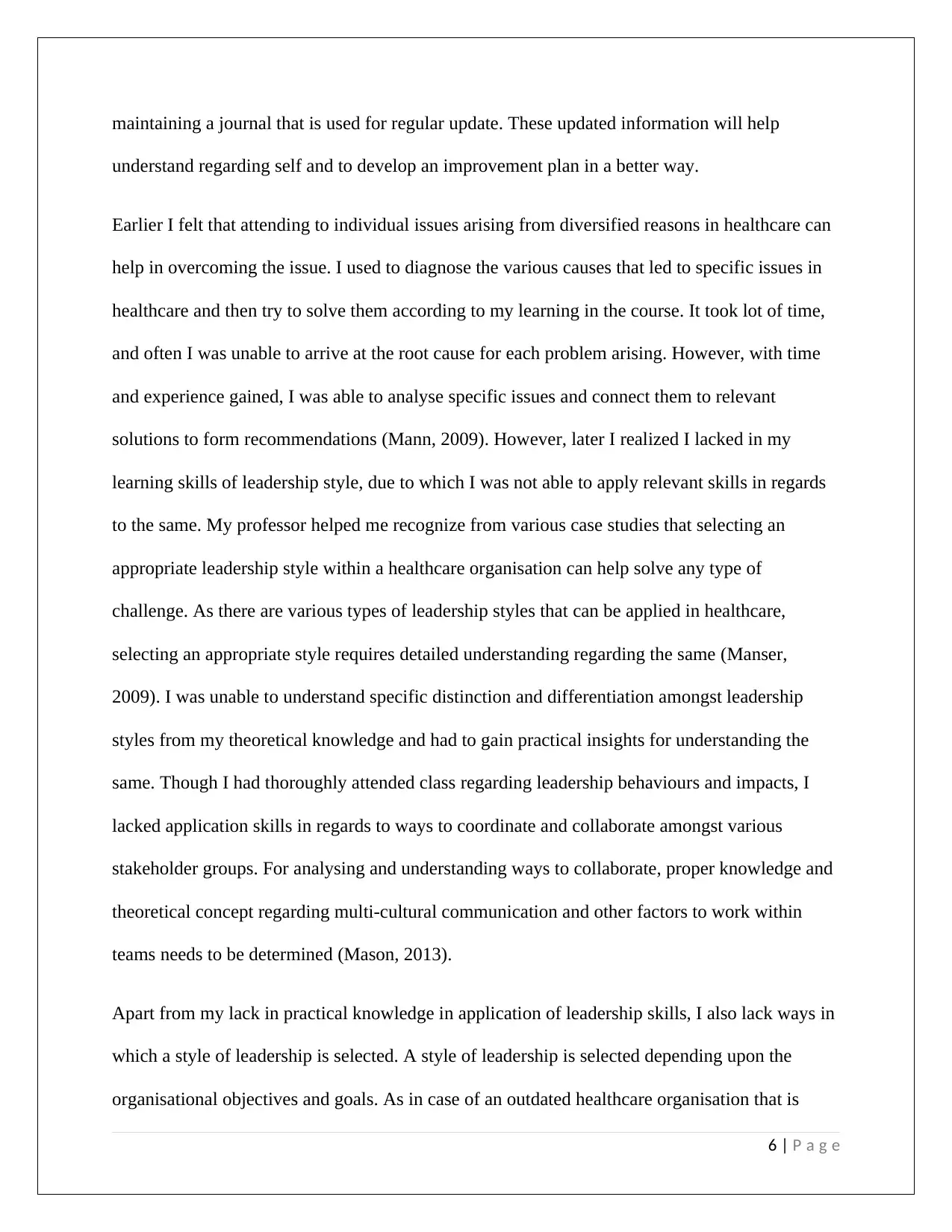
maintaining a journal that is used for regular update. These updated information will help
understand regarding self and to develop an improvement plan in a better way.
Earlier I felt that attending to individual issues arising from diversified reasons in healthcare can
help in overcoming the issue. I used to diagnose the various causes that led to specific issues in
healthcare and then try to solve them according to my learning in the course. It took lot of time,
and often I was unable to arrive at the root cause for each problem arising. However, with time
and experience gained, I was able to analyse specific issues and connect them to relevant
solutions to form recommendations (Mann, 2009). However, later I realized I lacked in my
learning skills of leadership style, due to which I was not able to apply relevant skills in regards
to the same. My professor helped me recognize from various case studies that selecting an
appropriate leadership style within a healthcare organisation can help solve any type of
challenge. As there are various types of leadership styles that can be applied in healthcare,
selecting an appropriate style requires detailed understanding regarding the same (Manser,
2009). I was unable to understand specific distinction and differentiation amongst leadership
styles from my theoretical knowledge and had to gain practical insights for understanding the
same. Though I had thoroughly attended class regarding leadership behaviours and impacts, I
lacked application skills in regards to ways to coordinate and collaborate amongst various
stakeholder groups. For analysing and understanding ways to collaborate, proper knowledge and
theoretical concept regarding multi-cultural communication and other factors to work within
teams needs to be determined (Mason, 2013).
Apart from my lack in practical knowledge in application of leadership skills, I also lack ways in
which a style of leadership is selected. A style of leadership is selected depending upon the
organisational objectives and goals. As in case of an outdated healthcare organisation that is
6 | P a g e
understand regarding self and to develop an improvement plan in a better way.
Earlier I felt that attending to individual issues arising from diversified reasons in healthcare can
help in overcoming the issue. I used to diagnose the various causes that led to specific issues in
healthcare and then try to solve them according to my learning in the course. It took lot of time,
and often I was unable to arrive at the root cause for each problem arising. However, with time
and experience gained, I was able to analyse specific issues and connect them to relevant
solutions to form recommendations (Mann, 2009). However, later I realized I lacked in my
learning skills of leadership style, due to which I was not able to apply relevant skills in regards
to the same. My professor helped me recognize from various case studies that selecting an
appropriate leadership style within a healthcare organisation can help solve any type of
challenge. As there are various types of leadership styles that can be applied in healthcare,
selecting an appropriate style requires detailed understanding regarding the same (Manser,
2009). I was unable to understand specific distinction and differentiation amongst leadership
styles from my theoretical knowledge and had to gain practical insights for understanding the
same. Though I had thoroughly attended class regarding leadership behaviours and impacts, I
lacked application skills in regards to ways to coordinate and collaborate amongst various
stakeholder groups. For analysing and understanding ways to collaborate, proper knowledge and
theoretical concept regarding multi-cultural communication and other factors to work within
teams needs to be determined (Mason, 2013).
Apart from my lack in practical knowledge in application of leadership skills, I also lack ways in
which a style of leadership is selected. A style of leadership is selected depending upon the
organisational objectives and goals. As in case of an outdated healthcare organisation that is
6 | P a g e
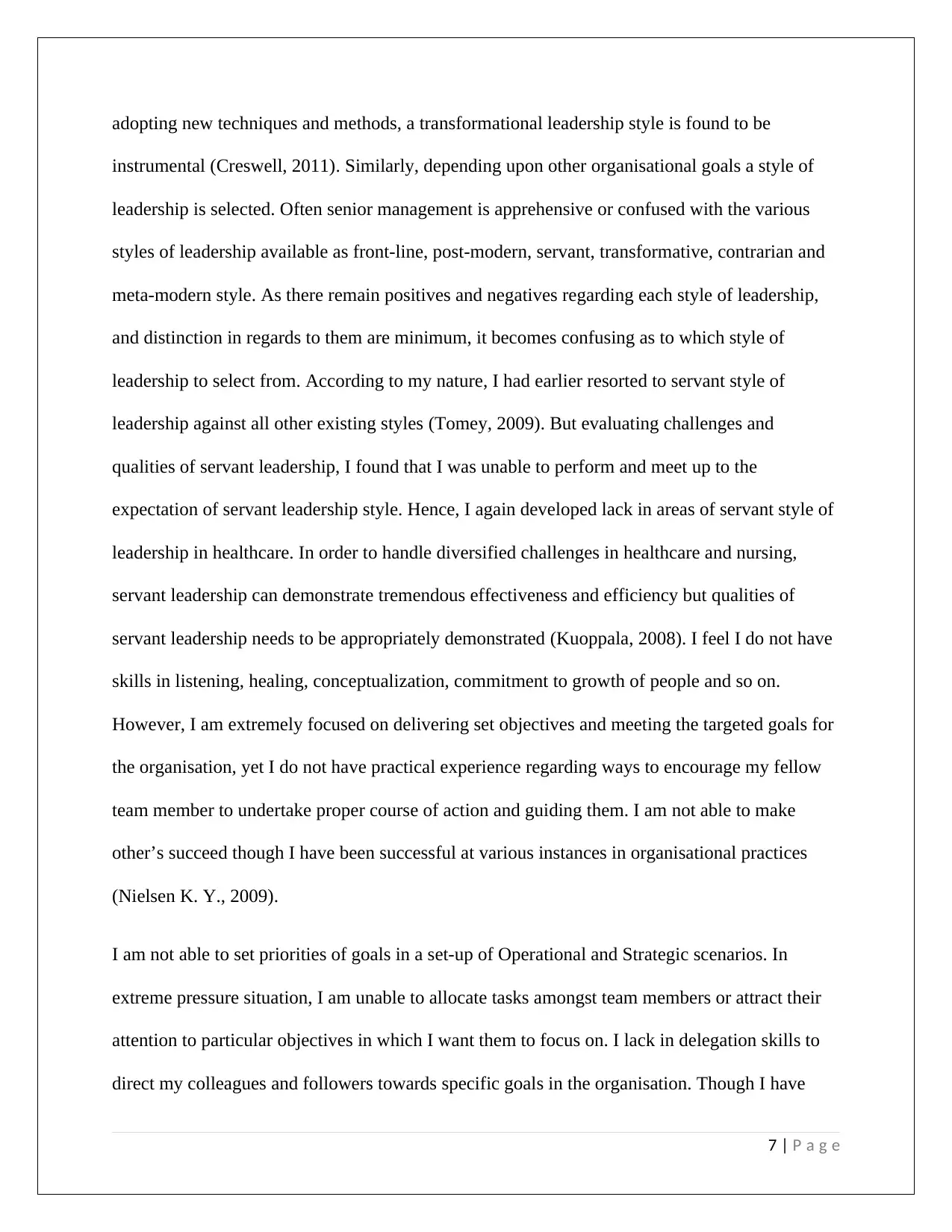
adopting new techniques and methods, a transformational leadership style is found to be
instrumental (Creswell, 2011). Similarly, depending upon other organisational goals a style of
leadership is selected. Often senior management is apprehensive or confused with the various
styles of leadership available as front-line, post-modern, servant, transformative, contrarian and
meta-modern style. As there remain positives and negatives regarding each style of leadership,
and distinction in regards to them are minimum, it becomes confusing as to which style of
leadership to select from. According to my nature, I had earlier resorted to servant style of
leadership against all other existing styles (Tomey, 2009). But evaluating challenges and
qualities of servant leadership, I found that I was unable to perform and meet up to the
expectation of servant leadership style. Hence, I again developed lack in areas of servant style of
leadership in healthcare. In order to handle diversified challenges in healthcare and nursing,
servant leadership can demonstrate tremendous effectiveness and efficiency but qualities of
servant leadership needs to be appropriately demonstrated (Kuoppala, 2008). I feel I do not have
skills in listening, healing, conceptualization, commitment to growth of people and so on.
However, I am extremely focused on delivering set objectives and meeting the targeted goals for
the organisation, yet I do not have practical experience regarding ways to encourage my fellow
team member to undertake proper course of action and guiding them. I am not able to make
other’s succeed though I have been successful at various instances in organisational practices
(Nielsen K. Y., 2009).
I am not able to set priorities of goals in a set-up of Operational and Strategic scenarios. In
extreme pressure situation, I am unable to allocate tasks amongst team members or attract their
attention to particular objectives in which I want them to focus on. I lack in delegation skills to
direct my colleagues and followers towards specific goals in the organisation. Though I have
7 | P a g e
instrumental (Creswell, 2011). Similarly, depending upon other organisational goals a style of
leadership is selected. Often senior management is apprehensive or confused with the various
styles of leadership available as front-line, post-modern, servant, transformative, contrarian and
meta-modern style. As there remain positives and negatives regarding each style of leadership,
and distinction in regards to them are minimum, it becomes confusing as to which style of
leadership to select from. According to my nature, I had earlier resorted to servant style of
leadership against all other existing styles (Tomey, 2009). But evaluating challenges and
qualities of servant leadership, I found that I was unable to perform and meet up to the
expectation of servant leadership style. Hence, I again developed lack in areas of servant style of
leadership in healthcare. In order to handle diversified challenges in healthcare and nursing,
servant leadership can demonstrate tremendous effectiveness and efficiency but qualities of
servant leadership needs to be appropriately demonstrated (Kuoppala, 2008). I feel I do not have
skills in listening, healing, conceptualization, commitment to growth of people and so on.
However, I am extremely focused on delivering set objectives and meeting the targeted goals for
the organisation, yet I do not have practical experience regarding ways to encourage my fellow
team member to undertake proper course of action and guiding them. I am not able to make
other’s succeed though I have been successful at various instances in organisational practices
(Nielsen K. Y., 2009).
I am not able to set priorities of goals in a set-up of Operational and Strategic scenarios. In
extreme pressure situation, I am unable to allocate tasks amongst team members or attract their
attention to particular objectives in which I want them to focus on. I lack in delegation skills to
direct my colleagues and followers towards specific goals in the organisation. Though I have
7 | P a g e
Paraphrase This Document
Need a fresh take? Get an instant paraphrase of this document with our AI Paraphraser
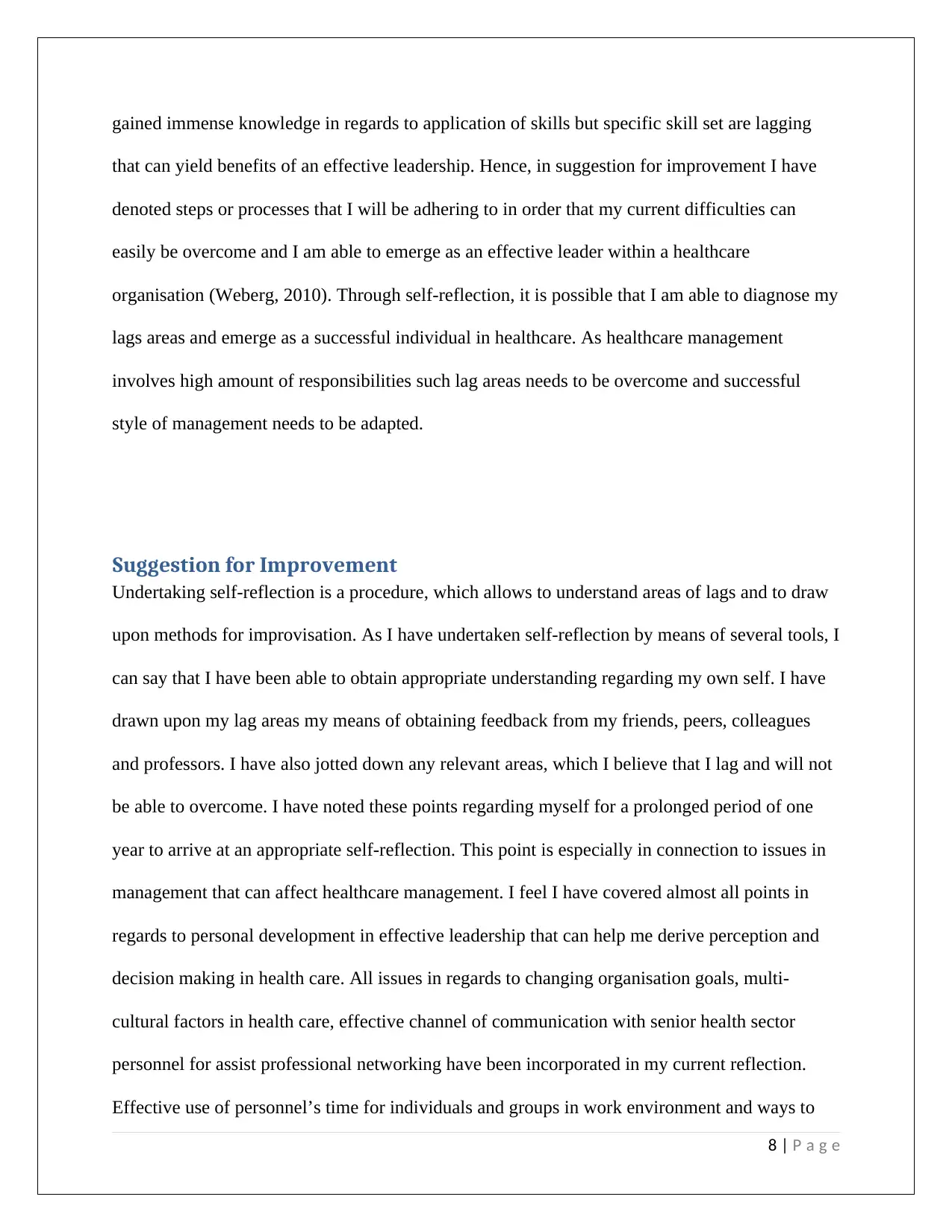
gained immense knowledge in regards to application of skills but specific skill set are lagging
that can yield benefits of an effective leadership. Hence, in suggestion for improvement I have
denoted steps or processes that I will be adhering to in order that my current difficulties can
easily be overcome and I am able to emerge as an effective leader within a healthcare
organisation (Weberg, 2010). Through self-reflection, it is possible that I am able to diagnose my
lags areas and emerge as a successful individual in healthcare. As healthcare management
involves high amount of responsibilities such lag areas needs to be overcome and successful
style of management needs to be adapted.
Suggestion for Improvement
Undertaking self-reflection is a procedure, which allows to understand areas of lags and to draw
upon methods for improvisation. As I have undertaken self-reflection by means of several tools, I
can say that I have been able to obtain appropriate understanding regarding my own self. I have
drawn upon my lag areas my means of obtaining feedback from my friends, peers, colleagues
and professors. I have also jotted down any relevant areas, which I believe that I lag and will not
be able to overcome. I have noted these points regarding myself for a prolonged period of one
year to arrive at an appropriate self-reflection. This point is especially in connection to issues in
management that can affect healthcare management. I feel I have covered almost all points in
regards to personal development in effective leadership that can help me derive perception and
decision making in health care. All issues in regards to changing organisation goals, multi-
cultural factors in health care, effective channel of communication with senior health sector
personnel for assist professional networking have been incorporated in my current reflection.
Effective use of personnel’s time for individuals and groups in work environment and ways to
8 | P a g e
that can yield benefits of an effective leadership. Hence, in suggestion for improvement I have
denoted steps or processes that I will be adhering to in order that my current difficulties can
easily be overcome and I am able to emerge as an effective leader within a healthcare
organisation (Weberg, 2010). Through self-reflection, it is possible that I am able to diagnose my
lags areas and emerge as a successful individual in healthcare. As healthcare management
involves high amount of responsibilities such lag areas needs to be overcome and successful
style of management needs to be adapted.
Suggestion for Improvement
Undertaking self-reflection is a procedure, which allows to understand areas of lags and to draw
upon methods for improvisation. As I have undertaken self-reflection by means of several tools, I
can say that I have been able to obtain appropriate understanding regarding my own self. I have
drawn upon my lag areas my means of obtaining feedback from my friends, peers, colleagues
and professors. I have also jotted down any relevant areas, which I believe that I lag and will not
be able to overcome. I have noted these points regarding myself for a prolonged period of one
year to arrive at an appropriate self-reflection. This point is especially in connection to issues in
management that can affect healthcare management. I feel I have covered almost all points in
regards to personal development in effective leadership that can help me derive perception and
decision making in health care. All issues in regards to changing organisation goals, multi-
cultural factors in health care, effective channel of communication with senior health sector
personnel for assist professional networking have been incorporated in my current reflection.
Effective use of personnel’s time for individuals and groups in work environment and ways to
8 | P a g e
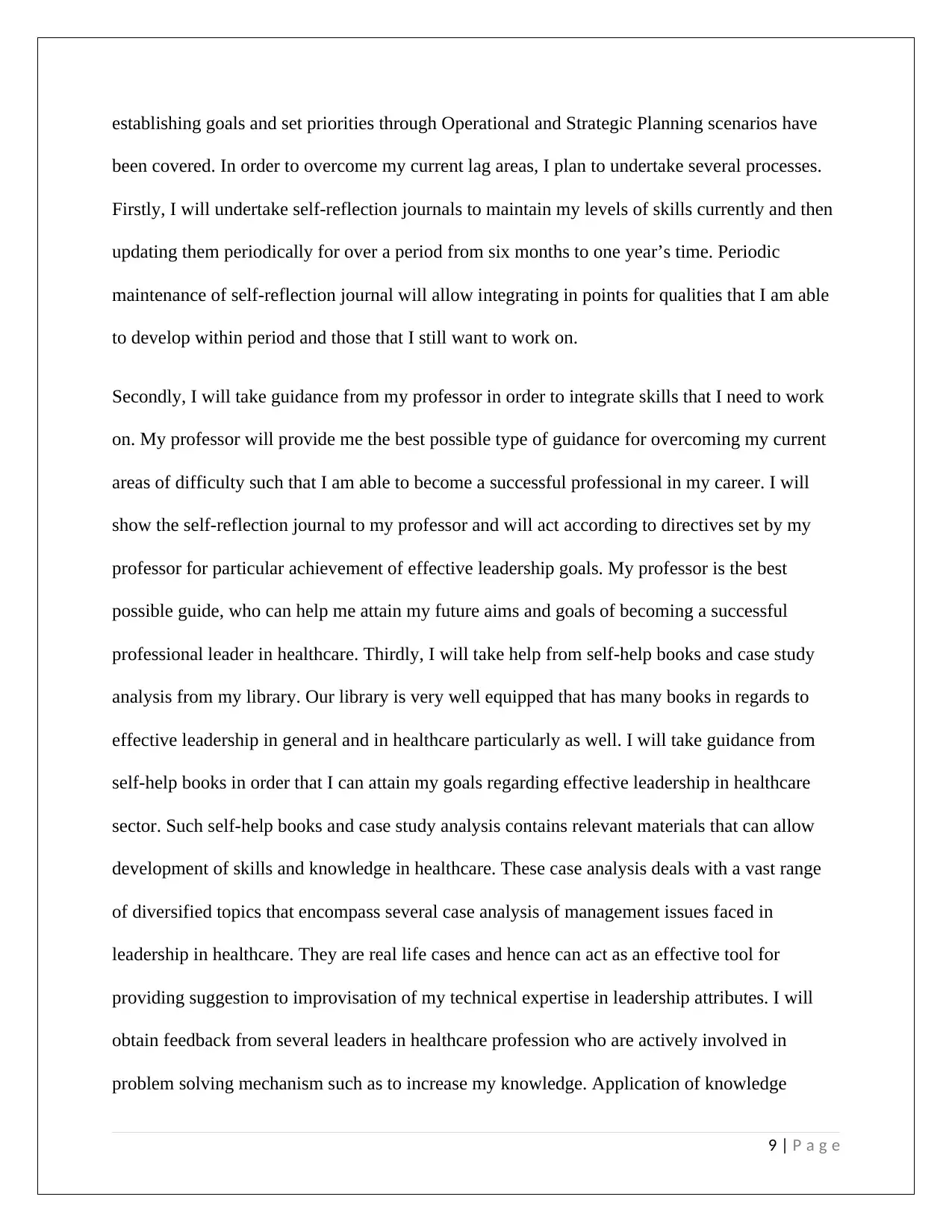
establishing goals and set priorities through Operational and Strategic Planning scenarios have
been covered. In order to overcome my current lag areas, I plan to undertake several processes.
Firstly, I will undertake self-reflection journals to maintain my levels of skills currently and then
updating them periodically for over a period from six months to one year’s time. Periodic
maintenance of self-reflection journal will allow integrating in points for qualities that I am able
to develop within period and those that I still want to work on.
Secondly, I will take guidance from my professor in order to integrate skills that I need to work
on. My professor will provide me the best possible type of guidance for overcoming my current
areas of difficulty such that I am able to become a successful professional in my career. I will
show the self-reflection journal to my professor and will act according to directives set by my
professor for particular achievement of effective leadership goals. My professor is the best
possible guide, who can help me attain my future aims and goals of becoming a successful
professional leader in healthcare. Thirdly, I will take help from self-help books and case study
analysis from my library. Our library is very well equipped that has many books in regards to
effective leadership in general and in healthcare particularly as well. I will take guidance from
self-help books in order that I can attain my goals regarding effective leadership in healthcare
sector. Such self-help books and case study analysis contains relevant materials that can allow
development of skills and knowledge in healthcare. These case analysis deals with a vast range
of diversified topics that encompass several case analysis of management issues faced in
leadership in healthcare. They are real life cases and hence can act as an effective tool for
providing suggestion to improvisation of my technical expertise in leadership attributes. I will
obtain feedback from several leaders in healthcare profession who are actively involved in
problem solving mechanism such as to increase my knowledge. Application of knowledge
9 | P a g e
been covered. In order to overcome my current lag areas, I plan to undertake several processes.
Firstly, I will undertake self-reflection journals to maintain my levels of skills currently and then
updating them periodically for over a period from six months to one year’s time. Periodic
maintenance of self-reflection journal will allow integrating in points for qualities that I am able
to develop within period and those that I still want to work on.
Secondly, I will take guidance from my professor in order to integrate skills that I need to work
on. My professor will provide me the best possible type of guidance for overcoming my current
areas of difficulty such that I am able to become a successful professional in my career. I will
show the self-reflection journal to my professor and will act according to directives set by my
professor for particular achievement of effective leadership goals. My professor is the best
possible guide, who can help me attain my future aims and goals of becoming a successful
professional leader in healthcare. Thirdly, I will take help from self-help books and case study
analysis from my library. Our library is very well equipped that has many books in regards to
effective leadership in general and in healthcare particularly as well. I will take guidance from
self-help books in order that I can attain my goals regarding effective leadership in healthcare
sector. Such self-help books and case study analysis contains relevant materials that can allow
development of skills and knowledge in healthcare. These case analysis deals with a vast range
of diversified topics that encompass several case analysis of management issues faced in
leadership in healthcare. They are real life cases and hence can act as an effective tool for
providing suggestion to improvisation of my technical expertise in leadership attributes. I will
obtain feedback from several leaders in healthcare profession who are actively involved in
problem solving mechanism such as to increase my knowledge. Application of knowledge
9 | P a g e
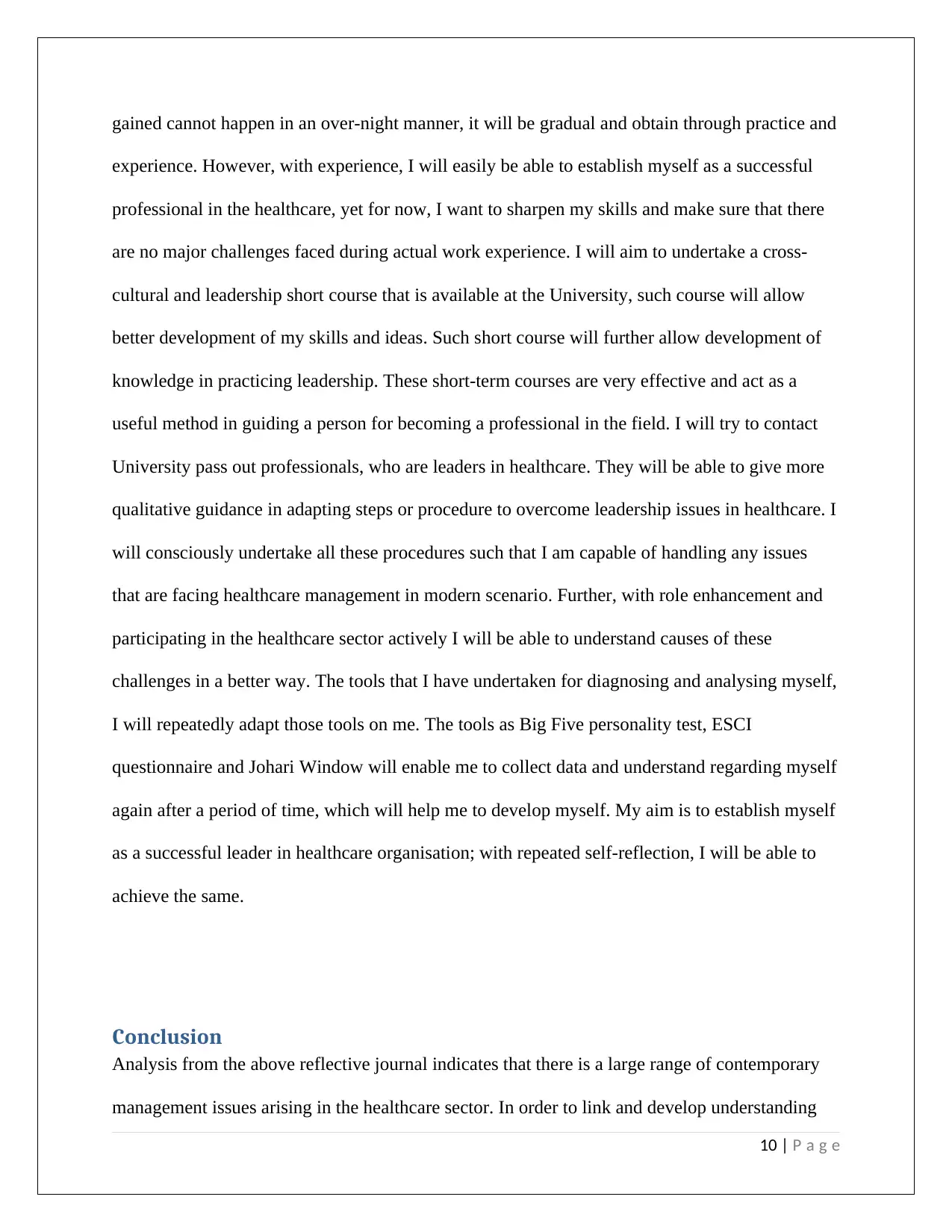
gained cannot happen in an over-night manner, it will be gradual and obtain through practice and
experience. However, with experience, I will easily be able to establish myself as a successful
professional in the healthcare, yet for now, I want to sharpen my skills and make sure that there
are no major challenges faced during actual work experience. I will aim to undertake a cross-
cultural and leadership short course that is available at the University, such course will allow
better development of my skills and ideas. Such short course will further allow development of
knowledge in practicing leadership. These short-term courses are very effective and act as a
useful method in guiding a person for becoming a professional in the field. I will try to contact
University pass out professionals, who are leaders in healthcare. They will be able to give more
qualitative guidance in adapting steps or procedure to overcome leadership issues in healthcare. I
will consciously undertake all these procedures such that I am capable of handling any issues
that are facing healthcare management in modern scenario. Further, with role enhancement and
participating in the healthcare sector actively I will be able to understand causes of these
challenges in a better way. The tools that I have undertaken for diagnosing and analysing myself,
I will repeatedly adapt those tools on me. The tools as Big Five personality test, ESCI
questionnaire and Johari Window will enable me to collect data and understand regarding myself
again after a period of time, which will help me to develop myself. My aim is to establish myself
as a successful leader in healthcare organisation; with repeated self-reflection, I will be able to
achieve the same.
Conclusion
Analysis from the above reflective journal indicates that there is a large range of contemporary
management issues arising in the healthcare sector. In order to link and develop understanding
10 | P a g e
experience. However, with experience, I will easily be able to establish myself as a successful
professional in the healthcare, yet for now, I want to sharpen my skills and make sure that there
are no major challenges faced during actual work experience. I will aim to undertake a cross-
cultural and leadership short course that is available at the University, such course will allow
better development of my skills and ideas. Such short course will further allow development of
knowledge in practicing leadership. These short-term courses are very effective and act as a
useful method in guiding a person for becoming a professional in the field. I will try to contact
University pass out professionals, who are leaders in healthcare. They will be able to give more
qualitative guidance in adapting steps or procedure to overcome leadership issues in healthcare. I
will consciously undertake all these procedures such that I am capable of handling any issues
that are facing healthcare management in modern scenario. Further, with role enhancement and
participating in the healthcare sector actively I will be able to understand causes of these
challenges in a better way. The tools that I have undertaken for diagnosing and analysing myself,
I will repeatedly adapt those tools on me. The tools as Big Five personality test, ESCI
questionnaire and Johari Window will enable me to collect data and understand regarding myself
again after a period of time, which will help me to develop myself. My aim is to establish myself
as a successful leader in healthcare organisation; with repeated self-reflection, I will be able to
achieve the same.
Conclusion
Analysis from the above reflective journal indicates that there is a large range of contemporary
management issues arising in the healthcare sector. In order to link and develop understanding
10 | P a g e
Secure Best Marks with AI Grader
Need help grading? Try our AI Grader for instant feedback on your assignments.
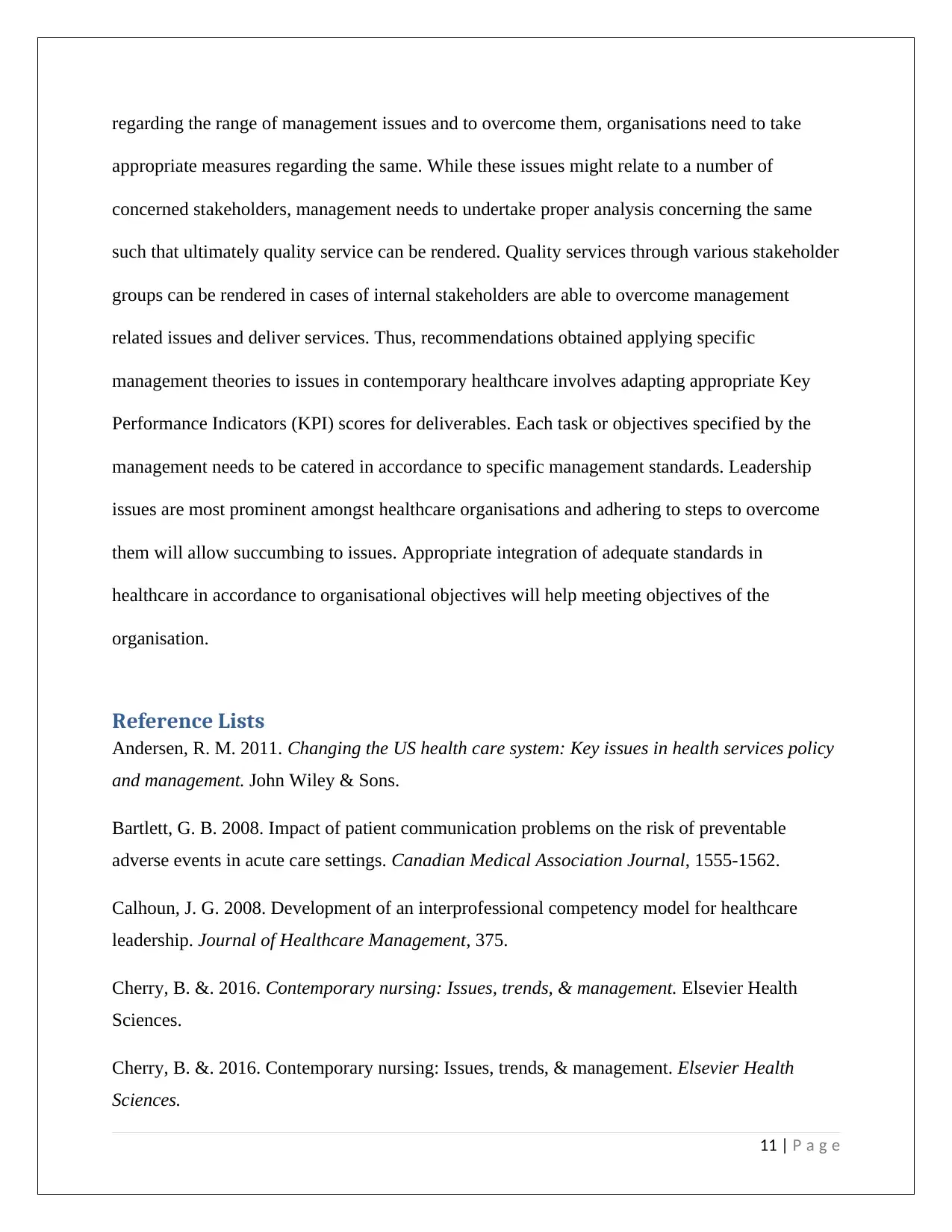
regarding the range of management issues and to overcome them, organisations need to take
appropriate measures regarding the same. While these issues might relate to a number of
concerned stakeholders, management needs to undertake proper analysis concerning the same
such that ultimately quality service can be rendered. Quality services through various stakeholder
groups can be rendered in cases of internal stakeholders are able to overcome management
related issues and deliver services. Thus, recommendations obtained applying specific
management theories to issues in contemporary healthcare involves adapting appropriate Key
Performance Indicators (KPI) scores for deliverables. Each task or objectives specified by the
management needs to be catered in accordance to specific management standards. Leadership
issues are most prominent amongst healthcare organisations and adhering to steps to overcome
them will allow succumbing to issues. Appropriate integration of adequate standards in
healthcare in accordance to organisational objectives will help meeting objectives of the
organisation.
Reference Lists
Andersen, R. M. 2011. Changing the US health care system: Key issues in health services policy
and management. John Wiley & Sons.
Bartlett, G. B. 2008. Impact of patient communication problems on the risk of preventable
adverse events in acute care settings. Canadian Medical Association Journal, 1555-1562.
Calhoun, J. G. 2008. Development of an interprofessional competency model for healthcare
leadership. Journal of Healthcare Management, 375.
Cherry, B. &. 2016. Contemporary nursing: Issues, trends, & management. Elsevier Health
Sciences.
Cherry, B. &. 2016. Contemporary nursing: Issues, trends, & management. Elsevier Health
Sciences.
11 | P a g e
appropriate measures regarding the same. While these issues might relate to a number of
concerned stakeholders, management needs to undertake proper analysis concerning the same
such that ultimately quality service can be rendered. Quality services through various stakeholder
groups can be rendered in cases of internal stakeholders are able to overcome management
related issues and deliver services. Thus, recommendations obtained applying specific
management theories to issues in contemporary healthcare involves adapting appropriate Key
Performance Indicators (KPI) scores for deliverables. Each task or objectives specified by the
management needs to be catered in accordance to specific management standards. Leadership
issues are most prominent amongst healthcare organisations and adhering to steps to overcome
them will allow succumbing to issues. Appropriate integration of adequate standards in
healthcare in accordance to organisational objectives will help meeting objectives of the
organisation.
Reference Lists
Andersen, R. M. 2011. Changing the US health care system: Key issues in health services policy
and management. John Wiley & Sons.
Bartlett, G. B. 2008. Impact of patient communication problems on the risk of preventable
adverse events in acute care settings. Canadian Medical Association Journal, 1555-1562.
Calhoun, J. G. 2008. Development of an interprofessional competency model for healthcare
leadership. Journal of Healthcare Management, 375.
Cherry, B. &. 2016. Contemporary nursing: Issues, trends, & management. Elsevier Health
Sciences.
Cherry, B. &. 2016. Contemporary nursing: Issues, trends, & management. Elsevier Health
Sciences.
11 | P a g e
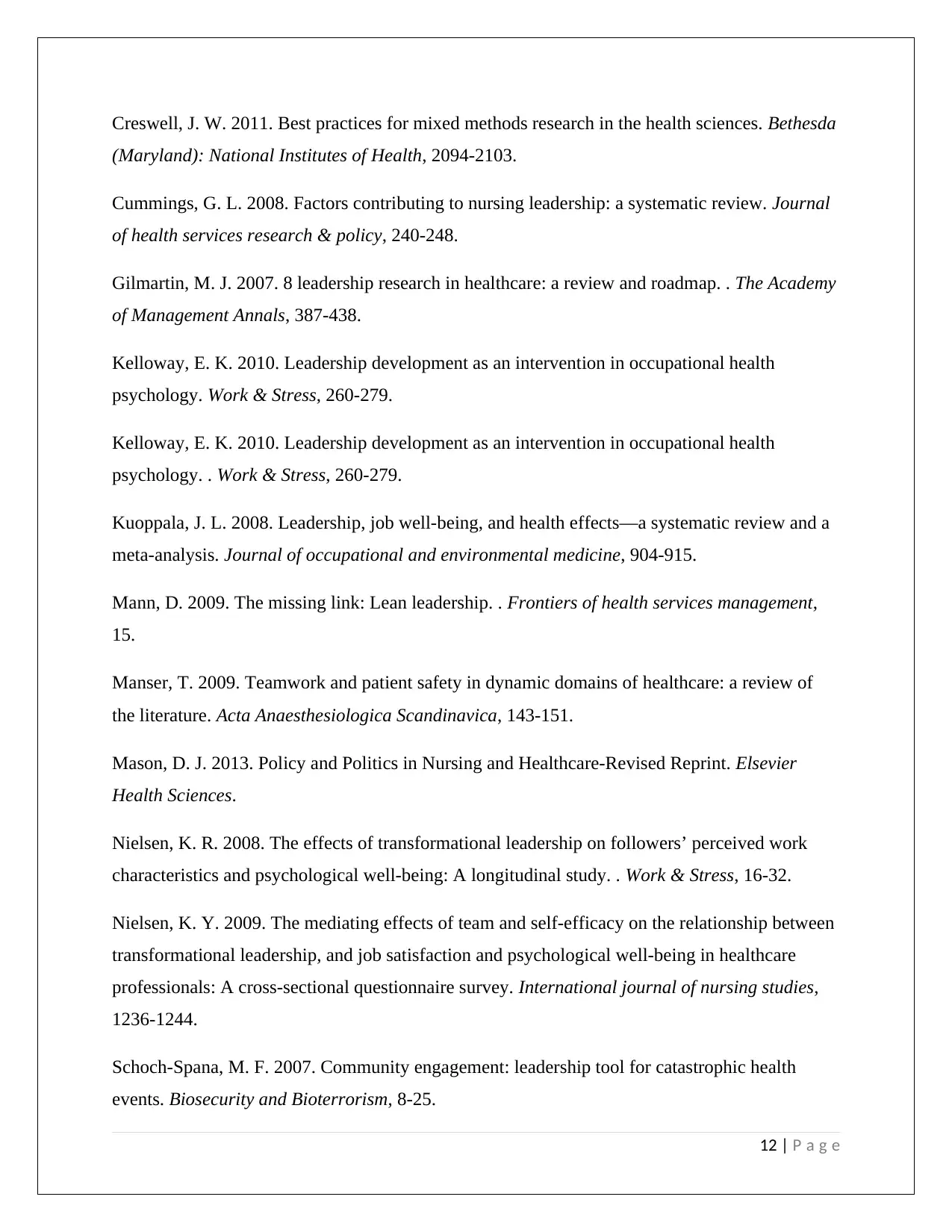
Creswell, J. W. 2011. Best practices for mixed methods research in the health sciences. Bethesda
(Maryland): National Institutes of Health, 2094-2103.
Cummings, G. L. 2008. Factors contributing to nursing leadership: a systematic review. Journal
of health services research & policy, 240-248.
Gilmartin, M. J. 2007. 8 leadership research in healthcare: a review and roadmap. . The Academy
of Management Annals, 387-438.
Kelloway, E. K. 2010. Leadership development as an intervention in occupational health
psychology. Work & Stress, 260-279.
Kelloway, E. K. 2010. Leadership development as an intervention in occupational health
psychology. . Work & Stress, 260-279.
Kuoppala, J. L. 2008. Leadership, job well-being, and health effects—a systematic review and a
meta-analysis. Journal of occupational and environmental medicine, 904-915.
Mann, D. 2009. The missing link: Lean leadership. . Frontiers of health services management,
15.
Manser, T. 2009. Teamwork and patient safety in dynamic domains of healthcare: a review of
the literature. Acta Anaesthesiologica Scandinavica, 143-151.
Mason, D. J. 2013. Policy and Politics in Nursing and Healthcare-Revised Reprint. Elsevier
Health Sciences.
Nielsen, K. R. 2008. The effects of transformational leadership on followers’ perceived work
characteristics and psychological well-being: A longitudinal study. . Work & Stress, 16-32.
Nielsen, K. Y. 2009. The mediating effects of team and self-efficacy on the relationship between
transformational leadership, and job satisfaction and psychological well-being in healthcare
professionals: A cross-sectional questionnaire survey. International journal of nursing studies,
1236-1244.
Schoch-Spana, M. F. 2007. Community engagement: leadership tool for catastrophic health
events. Biosecurity and Bioterrorism, 8-25.
12 | P a g e
(Maryland): National Institutes of Health, 2094-2103.
Cummings, G. L. 2008. Factors contributing to nursing leadership: a systematic review. Journal
of health services research & policy, 240-248.
Gilmartin, M. J. 2007. 8 leadership research in healthcare: a review and roadmap. . The Academy
of Management Annals, 387-438.
Kelloway, E. K. 2010. Leadership development as an intervention in occupational health
psychology. Work & Stress, 260-279.
Kelloway, E. K. 2010. Leadership development as an intervention in occupational health
psychology. . Work & Stress, 260-279.
Kuoppala, J. L. 2008. Leadership, job well-being, and health effects—a systematic review and a
meta-analysis. Journal of occupational and environmental medicine, 904-915.
Mann, D. 2009. The missing link: Lean leadership. . Frontiers of health services management,
15.
Manser, T. 2009. Teamwork and patient safety in dynamic domains of healthcare: a review of
the literature. Acta Anaesthesiologica Scandinavica, 143-151.
Mason, D. J. 2013. Policy and Politics in Nursing and Healthcare-Revised Reprint. Elsevier
Health Sciences.
Nielsen, K. R. 2008. The effects of transformational leadership on followers’ perceived work
characteristics and psychological well-being: A longitudinal study. . Work & Stress, 16-32.
Nielsen, K. Y. 2009. The mediating effects of team and self-efficacy on the relationship between
transformational leadership, and job satisfaction and psychological well-being in healthcare
professionals: A cross-sectional questionnaire survey. International journal of nursing studies,
1236-1244.
Schoch-Spana, M. F. 2007. Community engagement: leadership tool for catastrophic health
events. Biosecurity and Bioterrorism, 8-25.
12 | P a g e
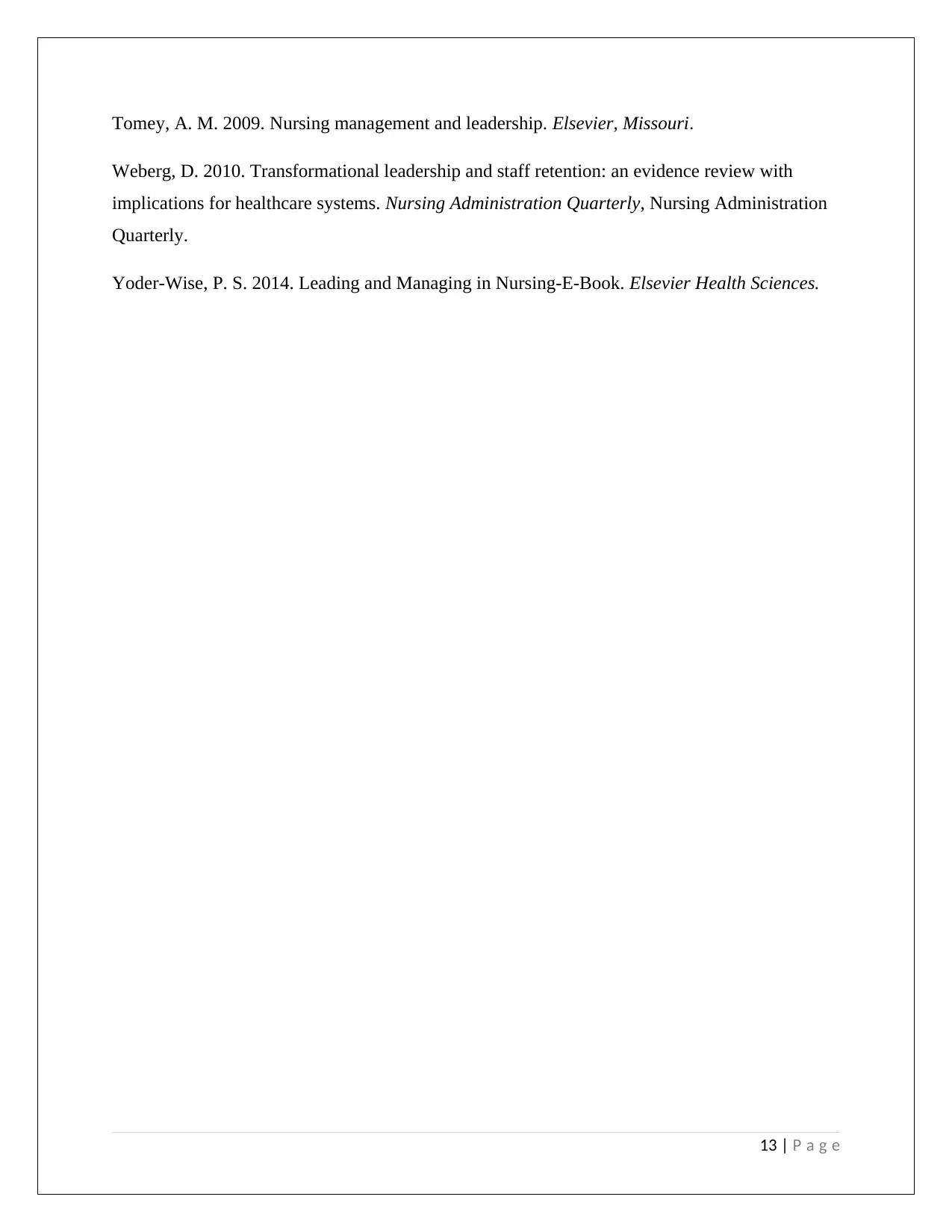
Tomey, A. M. 2009. Nursing management and leadership. Elsevier, Missouri.
Weberg, D. 2010. Transformational leadership and staff retention: an evidence review with
implications for healthcare systems. Nursing Administration Quarterly, Nursing Administration
Quarterly.
Yoder-Wise, P. S. 2014. Leading and Managing in Nursing-E-Book. Elsevier Health Sciences.
13 | P a g e
Weberg, D. 2010. Transformational leadership and staff retention: an evidence review with
implications for healthcare systems. Nursing Administration Quarterly, Nursing Administration
Quarterly.
Yoder-Wise, P. S. 2014. Leading and Managing in Nursing-E-Book. Elsevier Health Sciences.
13 | P a g e
1 out of 13
Related Documents
Your All-in-One AI-Powered Toolkit for Academic Success.
+13062052269
info@desklib.com
Available 24*7 on WhatsApp / Email
![[object Object]](/_next/static/media/star-bottom.7253800d.svg)
Unlock your academic potential
© 2024 | Zucol Services PVT LTD | All rights reserved.





